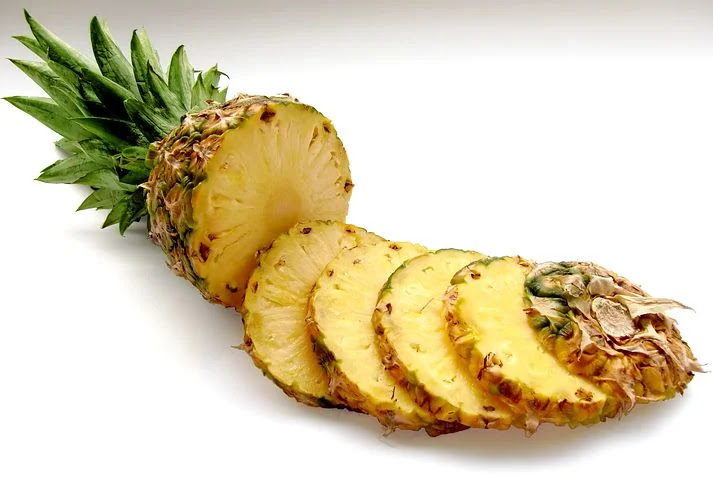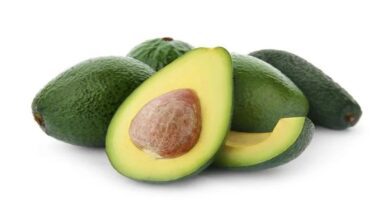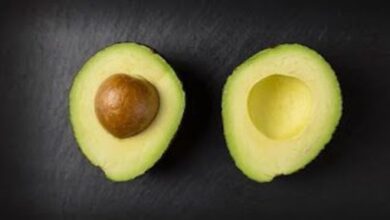Top Benefits of pineapple? What are benefits of pineapple juice?

Top Benefits of pineapple? What are benefits of pineapple juice?
Have you ever asked yourself, What are the benefits of pineapple? The benefits of pineapple are many but you may don’t know them or the side effects of pineapple. In this article, we will discuss in detail the benefits and side effects of pineapple and the benefits of pineapple juice in these points. Article contents:
- Pineapple
- General benefits of pineapple juice
- Benefits of pineapple
- Nutritional content of pineapple
- benefits of Pineapple with strong scientific evidence
- Benefits have less powerful scientific evidence
- Pineapple for babies
- The difference between canned and fresh pineapple
- Pineapple allergy
- Warning of eating pineapple
Pineapple
The pineapple belongs to the bromeliad family, and its scientific name is Ananas comosus, and its original habitat returns to the tropics in South America, while its cultivation is currently spread in most regions of the tropical and sub-tropical world, and is commonly used in the smoothies, cocktail drinks and pineapple juice. Also, it is added to the meat to soften it, and it is worth noting that pineapple is no less than 100 different types, but the common ones range between 7 to 8 types, and pineapple contains a pulp whose color ranges from pale yellow to golden and is formed by 13% of solid materials, and 0.6% of the citric acid, which provides a distinct smell.
General benefits of pineapple juice
The natural pineapple juice benefits rich in manganese, vitamin B6, vitamin C, and copper, which are important for bone health, the immune system, and energy production, and it provides small amounts of iron, phosphorus, calcium, zinc, vitamin K, choline, And a number of types of B vitamins, and pineapple juice also contain Bromelain, which helps the body break down and digest proteins. It should note that the processes that pineapple juice passes during preparation reduce the amount of this enzyme contained in it, but when drinking pineapple juice as part of a diet that contains a large amount of fiber, and is rich in vegetables and fruits, it may improve digestion. Despite these benefits of pineapple juice, it is better to eat pineapple instead of drinking Its juice, as eating fruits reduces the total calories obtained, and it also saves more fiber.
Benefits of pineapple
Pineapple contains many nutrients that the body needs, and it also provides many health benefits that differ in the strength of the proven scientific evidence for it. Discussed below in detail:
Nutritional content of pineapple
Antioxidants in pineapple
Pineapple considers as a plant rich in antioxidants, such as:
- Phenols
- Flavonoids
- Vitamin C
- bromelain
According to a preliminary study published in Molecules magazine in 2014, pineapple also contains bromelain; Which may reduce the level of inflammation.
Eating a diet rich in antioxidants helps reduce oxidative stress caused by free radicals, which may associate with infection with some health problems, such as cardiovascular disease, diabetes, and Alzheimer’s disease, Parkinson’s disease, and some eye problems, such as Cataracts, age-related macula degeneration, as well as some cancers.
According to the National Center for Complementary and Integrative Health (NCCIH), and given that free radicals may cause reproductive system damage, it advises eating foods rich in antioxidants for those trying to conceive, as it has fertility-enhancing properties for both women and men.
Vitamin C in pineapple
Vitamin C in pineapple also plays an important role in promoting growth, wound healing, and iron absorption, and improving skin health because it contains collagen.
It may contribute to maintaining eye health, as a study published in the Ophthalmology magazine in 2016 showed that a diet rich in vitamin C reduces the risk of developing cataracts and reduces its development for those who are suffering from cataracts.
Also, the fluid of the eye contains Vitamin C and Vitamin A, so following this diet may contribute to maintaining this liquid. It is worth noting that one cup of sliced pineapple contains 131% of the recommended daily amount of vitamin C.
Beta carotene in pineapple
Plants of orange, yellow, and dark green color contain beta carotene. Examples of these plants are pineapple, mango, papaya, apricots, broccoli, cantaloupe, carrots, and carrots.
Beta carotene consumption may help in reducing the risk of asthma, and a study published in the Clinical Oncology Journal in 2014 indicated that consumption of beta carotene may reduce the risk of colon cancer.
An observational study built on observation from Harvard College of Public Health published in 2004 found that the intake of beta carotene-containing foods associate with a lower risk of prostate cancer, but a recent study conducted at Tongji University in 2015 confirmed no link between beta-carotene consumption and prostate cancer.
Potassium in pineapple
One cup of chopped pineapple contains 5% of the recommended daily amount of potassium, and increased potassium intake by consuming higher fruits and vegetables can help lower blood pressure, in addition to that the higher consumption of potassium-rich foods reduces the risk of death from cardiovascular disease, etc.
Fibers in pineapple
One cup of sliced pineapple contains 9% of the recommended daily amount of dietary fiber, and a diet rich in fiber will help reduce blood sugar levels in people with type 1 diabetes, and it may improve the level of fats, sugar, and insulin in people with type 2 diabetes.
Benefits of Pineapple with strong scientific evidence
Pineapple helps with digestion:
Pineapple contains several digestive enzymes called bromelain, which affects a group of enzymes known as a protease that breaks down protein into its basic constituents such as amino acids and small peptides to absorb protein in the small intestine more easily, which may be beneficial for people with pancreatic insufficiency; Where they cannot produce digestive enzymes in sufficient quantities, a study published in the British Medical Journal showed that taking a product containing bromelain and extract of pancreatic enzymes by patients with pancreatic insufficiency improved their fat absorption process, and it is worth noting bromelain is usually adding to processed meat for its role in meat softening.
It enhances immunity:
Pineapple distinguishes by its wide range of vitamins, minerals, and enzymes that may enhance the strength of the immune system and reduce inflammation, a study reported In the Journal of Nutrition and Metabolism in 2014, conducted on 98 healthy children between the ages of eight and nine years old, and the study lasted for nine weeks, in which it was found that children who consumed pineapples were less likely to infect with viral and bacterial infections, and the study concluded that the increase in eating pineapples may reduce the duration of infection, and increase the number of Granulocytes that belong to the immune system and are related to infection control.
An observational study published in In Vivo magazine in 2005 and conducted on 116 children under 11 years of age suffering from sinusitis, It was noting that some children who ingested a product containing bromelain contained in pineapple helped to quickly recover from the symptoms of acute sinusitis.
Pineapple increase recovery speed after undergoing surgery or exercise:
pineapple intake may reduce the time it takes for the body to recover after undergoing surgery or strenuous exercise, due to the properties of bromelain that reduce inflammation.
According to a study conducted at the University of Mosul in 2014, consuming bromelain before and after surgery to remove the wisdom tooth in the lower jaw reduces postoperative symptoms, such as pain, swelling, etc.
Bromelain also speeds up the recovery of tissues after intense exercise, this type of exercise may lead to muscle tissue damage, and cause inflammation of the area surrounding the affected muscles, and this pain results for up to three days,
According to a study from Baylor University in 2009, eating a group of digestive enzymes that contain bromelain found in pineapple, after 45 minutes of performing these exercises may reduce inflammation and enhance muscle strength.
Pineapple relieves pain in people with arthritis:
Because pineapple contains bromelain, which has properties that reduce inflammation. A study from King Edward Medical University in 2004, conducted on 103 people with degenerative arthritis of the knee, showed that taking supplements of digestive enzymes containing bromelain significantly reduces their pain.
Also, a review published in the magazine of Evidence-Based Complementary and Alternative Medicine in 2004 demonstrated the role of bromelain in relieving arthritis in the short term, but more studies are still needing on the ability of bromelain to relieve the symptoms of chronic degenerative arthritis.
Benefits have less powerful scientific evidence
Pineapple reduce the risk of cancer:
Where cancer is a chronic disease as a result of abnormal cell growth, the progression of cancer is linked to oxidative stress and chronic infections, and several studies have been conducted on the role of pineapple and some of its components in reducing the risk of cancer.
In a laboratory study published in Cancer Letters in 2010, found that bromelain found in pineapple has an effect that reduces inflammation and the risk of cancer.
Another laboratory study from the University of Naples Federico II found and published in 2014, found that this substance has a damping effect on cancer cell growth in the colon, as well as stimulating Apoptosis of cells. Therefore eating bromelain-containing foods, such as pineapple, may help reduce the risk of colon and rectal cancer.
A laboratory study from Nova South-eastern University reported in 2012 that increased bromelain intake was associating with a rise in programmed cell death in breast cancer cells. Another laboratory study from the University of Teknologi Malaysia in 2015 also showed that drinking pineapple juice may induce programmed cell death in both cells of the colon and ovaries.
Pineapple for weight loss
Pineapple juice helps to enhance the process of digesting fats, and thus reduce the risk of obesity, and the severity of cardiovascular diseases, and reduce dyslipidemia, which is the presence of abnormal amounts of fats in the blood, according to a study conducted on mice,
published in Food Science and Biotechnology in 2018, and researchers believe that the content of pineapple from the Bromelain enzyme is the cause of these health benefits of pineapple, but more human studies are still needing to confirm these findings.
It is worth noting that pineapple fruit is a low-calorie fruit rich in dietary fiber, which contributes to promoting a feeling of satiety;
Thus reducing food intake and weight loss, and in general, it is worth noting that regardless of the type of food eaten, the main rule in losing weight is eating calories less than those consumed by the body.
Read more about weight loss:

Pineapple for babies
You can start adding pineapple to the infant’s diet if they are over 6 months old, according to the American Academy of Paediatrics.
The pineapple is rich in nutrients, such as vitamin C, vitamin B6, and magnesium. But it is worth noting that his introduction into the child’s diet during this period will be gradual by waiting for two to three days before introducing another type of solid food from vegetables and fruits to reduce the possibility of an allergic reaction.
should note that many researchers warn about the consumption of citrus fruits by infants because pineapple contains citric acid may be linked to irritation of the stomach or diaper rash, and therefore it is advisable before entering into their diet to consume a small amount of it, and to observe how infant bodies respond to it, and it is advised that in case of sensitivity to it enter it after reaching the year.
The difference between canned and fresh pineapple
The canned pineapple is rich in sugars, due to the liquid added to it when canning, which contains about one teaspoon to 4 teaspoons of sugar, so it is advised to pour the liquid in the box, in addition to washing the pineapple before consuming it, or choose canned pineapple free of added sugar. If you want to use canned pineapple juice, we recommend DEL MONTE DELUXE GOLD Canned Sliced Pineapple in 100% Juice, 24 Pack, 20 oz Can.
Pineapple allergy
Allergic reactions due to fruits are less common compared to other foods but may be dangerous sometimes, and the risk of pineapple allergy increases if you develop allergies to fruits, pollen, or latex, and the sensitivity of pineapple is represented by several symptoms, such as itching, rash, stomach pain, vomiting, diarrhea, and difficulty breathing.
For people with this allergy a small amount of pineapple, drinking its juice, or even touching pineapple may lead to the appearance of the previous symptoms, and if the sensitivity is severe, it may result in anaphylactic shock, which is life-threatening and the doctor should review at the time.
Warning of eating pineapple
Drinking unripe pineapple juice may result in side effects such as severe vomiting, although taking bromelain present in pineapple is not associated with a high incidence of harmful effects, it may lead to diarrhea, increased menstrual flow, nausea, rash, and vomiting in some people, and eating large amounts from pineapple fruit may lead to the flatulence of cheeks and face.
Finally, the benefits of pineapple make it a highly valuable fruit, but you should take care when eating it to avoid allergy risks. Do you have an allergy to any fruit? Tell us in the comments.
Read more:
What Are the Healthiest Fruits? Nutrients and Health Benefits of Fruits
+15 Best Apple Benefits for Skin and Hair : Apple Benefits for Health




Leave a Reply